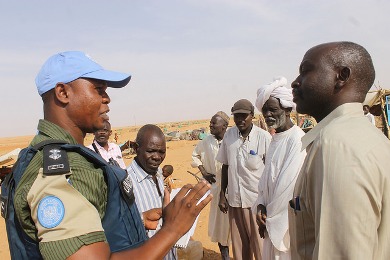Sudan’s SRF welcomes extension of UNAMID mandate
July 3, 2015 (KHARTOUM) – The rebel Umbrella Sudanese Revolutionary Front (SRF) on Friday welcomed the renewal of the mandate of Darfur hybrid peacekeeping operation (UNAMID) for additional 12 months, pointing to its needed presence in the protection of civilians.

The UK which was the penholder of the draft resolution and the US pushed to disregard this exit strategy and insisted to make it clear in the decision that “UNAMID shall consist of up to 15,845 military personnel, 1,583 police personnel and 13 formed police units of up to 140 personnel”.
The resolution (2228) further emphasized that “any refinement of the mission should be based on progress against the benchmarks (protection of civilians, humanitarian situation and peace process) and the conditions on the ground, and implemented in a gradual, phased, flexible and reversible manner”.
“The SRF supports requiring that any future UNAMID scale down or withdrawal be based on concrete benchmarks and conditions on the ground,” said a statement extended to Sudan Tribune by the SRF deputy chairman, and head of media sector Eltom Haju on Friday.
“We further agree with Resolution 2228 that a cessation of hostilities and peace talks leading to a genuine political settlement in Darfur is primary to the achievement of these benchmarks,” Haju further said.
The rebel alliance expressed their appreciation for the support of the Security Council for a comprehensive approach to achieving durable peace for Darfur, as well as for all of Sudan.
“Though Resolution 2228 still overemphasized the relevance of the outdated DDPD, the SRF is encouraged that the UNSC does not seek to rely on the DDPD as the sole means of moving forward the Darfur peace process and instead views the DDPD as viable framework, to be taken together with the AUHIP-led peace talks and an inclusive and comprehensive national dialogue”.
They also said encouraged that the Council didn’t seek to promote the national dialogue process initiated by president Omer al-Bashir and stressing that 15 member body only expressed its support for “credible moves” for a comprehensive, inclusive and nationally -owned dialogue.
Since last April, the rebel groups and their allied opposition forces expressed doubts over the viability of the national dialogue process after Khartoum rejection to take part in a pre-dialogue meeting to define the procedures and issued related to the process.
The opposition forces , including those who are taking part in the internal process, demand that the government implement confidence building measures including freedom of expression and movement, release of political detainees and prisoners and a cessation of hostilities.
But the government only offers guaranties for the safety of those who accept to come in Khartoum to participate in the meeting saying all the other issues should be debated within the dialogue conference.
(ST)
